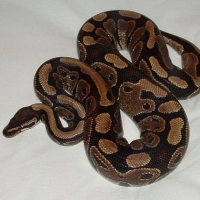

Snakes. Legless and arm less killing machines. Steeped in myth, and revered for centuries. For thousands of years, humans have looked at these animals with fear and awe. And in the past, very few people kept them as pets, and even then, it was mostly royalty who did. And one of the best snakes to include in any family, back then and today, is the Ball Python.
The ball python (Python regius) is a non-venomous python that is originally from Africa. Of all the African pythons, it is the smallest. It is also very docile, which makes it a popular pet. It got its name "Ball Python" because when it is scared or stressed, it curls into a ball. It is also called a "Royal Python" because African rulers would wear them a jewelry.
The Python regius (ball python) covers many different regions in Africa. These regions are:
These snakes do not grow very big, and have various and beautiful colorings and markings. They can typically grow from 5-6 feet long, and have a thick body and small head. Males tend to mature at 3 to 3.5 feet, while females mature at anywhere from 4 to 4.5 feet. The females are usually larger than the males. There is a great variety of patterns among them, and the colorings can vary as well. Their belly is a cream or white color, and sometimes there are black markings scattered along the belly. Their backs are usually a dark brown or black, and their sides can be gold or light brown. On the back and sides, patterns are noticeable from head to tail.
The behavior of these pythons is what makes them good pets. You don't have to guess long and hard about their attitude. For instance, if you see your python curled up into a tight ball, with its neck and head tucked into the middle, then you know it is either scared or stressed. This is a defense strategy. If the temperature is to high, or conditions are arid, they will often Aestivate (be dormant) in a hiding spot such as a mammal burrow or an underground hiding place. Also, the more you handle them, the more comfortable with you they will be. Adults who are bred in captivity rarely bite.
If you are thinking about breeding these animals in your home, there are a few things you should know. First, these animals are Oviparous, which means the females will lay eggs. They can lay as many as 3 to 11 leathery, large eggs, and prefer to be underground, or hiding when incubating them, which they achieve by using a shivering motion on and around the eggs. The eggs typically hatch in 60 days, and once they have hatched, the mother no longer cares for the young. It is important to remove and separate the babies as soon as possible, to prevent fighting.
When in the wild, ball pythons stay away from deserts, and instead prefer landscapes where they can easily hide. Some examples are:
Ball Pythons like to eat. Who doesn't? But what they eat is a bit different from what we eat. They can be picky eaters, and during winter may not eat for several months. If this happens, monitor them for abnormal weight loss. Also, when they are getting ready to shed, they may not feel like eating. Some other reasons why they might not are: parasites, not enough places to hide, stress caused by overhandling, changes in humidity, and changes in temperature. On average, feeding them once a week keeps them healthy and growing. The most common food sources for Ball Pythons in captivity are: domestic rats and mice, either frozen (then thawed), killed, or live.
These magnificent beings are also important in the folklore and beliefs of some cultures. For example, the Igbo people of southeastern Nigeria view them with reverence, because they feel that ball pythons are symbolic to the earth. Even among the Igbo's who are Christians, they are very highly regarded. Ball pythons are allowed into the villages and homes, and if one is accidentally killed, they hold a funeral for it, complete with a coffin and burial.
Ball pythons are docile and gentle, making them excellent pets. But, like all pets, they do require special care to stay healthy and to grow. If you take care of them properly, they can live a long time, adding years of enjoyment to your family!
Copyright © 2005-2016 Pet Information All Rights Reserved
Contact us: www162date@outlook.com